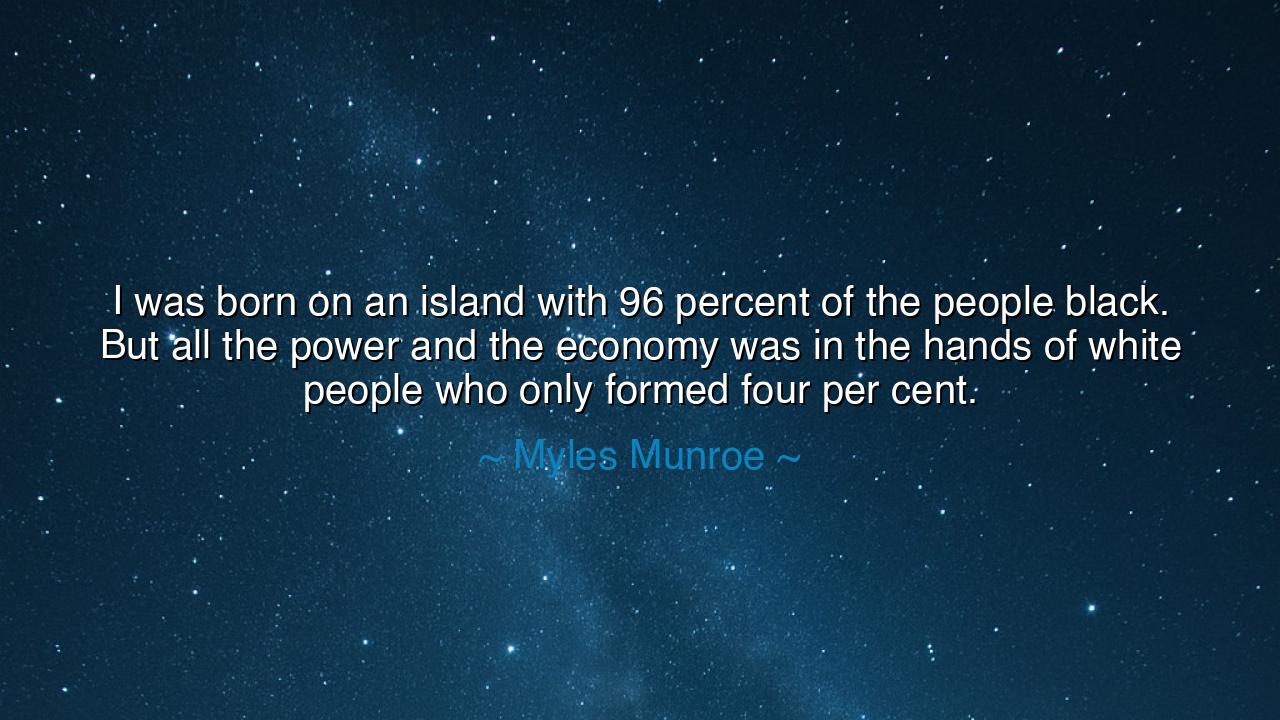
I was born on an island with 96 percent of the people black. But
I was born on an island with 96 percent of the people black. But all the power and the economy was in the hands of white people who only formed four per cent.






Hearken, O children of justice, to the words of Myles Munroe, who bears witness to the stark imbalance of power and economy. He declares that though he was born among a people ninety-six percent black, the levers of governance and wealth were held by a minority of four percent white. Herein lies a teaching for the ages: the possession of authority and resources is often divorced from the majority, and understanding this disparity is the first step toward awakening, empowerment, and the pursuit of equitable society.
The origin of this reflection is rooted in Munroe’s life on the island of the Bahamas, where colonial and post-colonial structures entrenched minority control over economic and political life. Observing the lives of his fellow citizens, he discerned that mere numbers do not confer influence, and that freedom, prosperity, and dignity require knowledge, leadership, and the courage to challenge entrenched hierarchies. His words serve as both testimony and admonition: to recognize inequity is to be called to action.
The meaning of this aphorism is profound: systemic imbalance of power is both visible and insidious. When a small elite holds sway over the lives of the majority, injustice thrives, and the natural potential of the people is suppressed. Munroe reminds us that awareness of such conditions is the beginning of wisdom, and that empowerment demands not only recognition but deliberate cultivation of knowledge, leadership, and strategic action.
History provides testimony to this teaching. Consider the struggle of Nelson Mandela and the African National Congress in South Africa, where a white minority governed and controlled the economy over a black majority. Through steadfast leadership, moral courage, and collective action, the oppressed were able to reclaim both political and economic authority, demonstrating that understanding disparity is the first step toward transforming it into equitable power.
Moreover, this lesson extends beyond national boundaries to every society where inequality persists. Whether in governance, commerce, or social structures, the recognition of disproportionate power empowers the many to seek fairness, build institutions, and cultivate leadership capable of restoring balance. Munroe’s insight reminds all generations that mere numbers alone cannot guarantee influence, but that knowledge, courage, and organization can redress the scales of justice.
O generations yet unborn, take this counsel into your hearts: observe the structures of power around you, discern inequity, and cultivate the wisdom, courage, and leadership necessary to claim rightful influence. For it is through understanding, preparation, and deliberate action that the oppressed may rise, and a society governed by equity, justice, and shared prosperity may endure across the ages.






DHBach Duy Hoang
Reading this, I’m struck by the contrast between population and power distribution. How does such disparity influence identity, self-perception, and opportunity for the majority? I also question whether concentrated economic power among a small minority leads to policies that reinforce inequality. What lessons can other nations learn from this situation regarding equitable governance, inclusive growth, and social justice? It also makes me think about the resilience and strategies communities develop under such imbalance.
Ddhosjdo
This quote raises questions about justice and representation. If 96 percent of the population has minimal power, what mechanisms exist to amplify their voices in politics and economics? I also wonder how such imbalance shapes societal stability and intergroup relations. Could education, entrepreneurship, and civic engagement help correct systemic inequities, or does meaningful change require broader structural transformation? This makes me reflect on the ethical responsibility of those who hold disproportionate power.
Hhoa
I find this statement powerful because it underscores the tension between numerical strength and actual power. What social, political, and economic systems allow a small minority to dominate resources and decision-making? I also question the long-term impact on national development, social mobility, and trust in institutions. How can leadership and governance evolve to align demographic representation with equitable access to opportunity, wealth, and influence?
CCCam con
This perspective prompts reflection on the intersection of race, power, and economics. How does a situation where a demographic majority lacks control over national resources persist for generations? I also wonder whether similar dynamics exist elsewhere in the world, and how cultural, historical, and political factors sustain such inequalities. Could reform, policy change, or grassroots mobilization effectively redistribute economic and political influence, or are structural barriers too entrenched?
TPNguyen Thanh Phuoc
Reading this, I’m struck by the inequality and injustice implied. Does this mean that wealth and power are inherently concentrated in minority groups, or is it a result of intentional systemic oppression? I also question how such a dynamic influences individual and collective psychology, aspirations, and opportunities. How does it shape access to education, entrepreneurship, and leadership for the majority population, and what interventions can promote fairness and inclusivity?